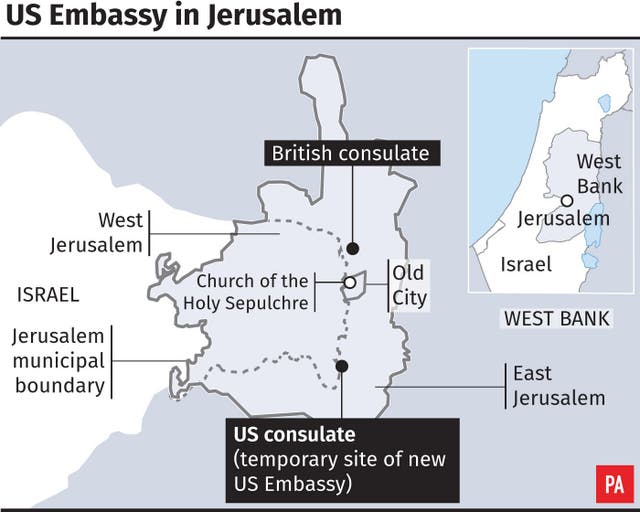
Several Palestinians have been killed and hundreds more were injured after Israeli troops opened fire on protesters gathered along the border with Israel in a confrontation that threatens to cast a shadow over the inauguration of the new US embassy in Jerusalem.
Thousands of demonstrators have gathered at the border, setting fire to tyres and sending thick plumes of black smoke into the air to deter Israeli snipers at several spots, while the Israeli military said the protests were being used as cover for attacks and assaults on the border fence.
At least eighteen Palestinians were killed and more than 500 others were wounded by Israeli gunfire, according to Palestinian health officials.
In the West Bank, several thousand people gathered in the centre of Ramallah, while hundreds marched to the Qalandiya crossing on the outskirts of Jerusalem, where protesters threw stones at Israeli troops.
Monday marks the biggest showdown in recent weeks between Israel’s military and Gaza’s Hamas rulers along the volatile border.

The protest in Gaza is part of a weeks-long campaign against a decade-old blockade of the territory. The march was also directed at the inauguration of the US embassy in Jerusalem later on Monday. The relocation of the embassy from Tel Aviv has infuriated the Palestinians, who seek east Jerusalem as a future capital.
It is the culmination of a campaign, led by the Islamic militants Hamas and fuelled by despair among Gaza’s two million people, to break the blockade of the border territory by Israel and Egypt. Since weekly border marches began in late March, 60 Palestinian protesters have been killed and more than 2,300 wounded by Israeli army fire.
Hamas leaders have suggested a border breach is possible on Monday, while Israel has warned it would prevent protesters from breaking through the barrier at any cost.

Israeli military spokesman Lt Col Jonathan Conricus said the army had bolstered its front-line forces along the border, but also set up additional “layers” of security in and around neighbouring communities to defend Israeli civilians in case of a mass breach. He said there had already been several “significant attempts” to break through the fence.
“Even if the fence is breached, we will be able to protect Israeli civilians from attempts to massacre or kidnap or kill them,” he said.
With Israel and Hamas digging in, there is growing concern about large numbers of casualties.
The date of the inauguration is deeply symbolic to both Israelis and Palestinians. The US said it chose the day to coincide with the 70th anniversary of Israel’s establishment.
But it also marks the anniversary of what Palestinians call their “nakba”, or catastrophe, a reference to the uprooting of hundreds of thousands who fled or were expelled from what is now Israel during the 1948 war surrounding Israel’s independence.

A majority of Gaza’s two million people are descendants of refugees, and the protests have been billed as the “Great March of Return”.
Leaflets dropped over Gaza by army jets warned that those approaching the border “jeopardise” their lives. The warning said the army is “prepared to face all scenarios and will act against every attempt to damage the security fence or harm IDF soldiers or Israeli civilians”.
In Jerusalem, top officials in US president Donald Trump’s administration attended events linked to the inauguration of the embassy.
US treasury secretary Steven Mnuchin said that it was a US “national security priority” to move the embassy from Tel Aviv to Jerusalem.
Mr Trump’s decision to go forward with a campaign promise to move the American embassy from Tel Aviv to Jerusalem was welcomed by Israel and condemned by the Palestinians. Previous US presidents had signed a waiver postponing the move, citing national security.

Israel captured east Jerusalem in the 1967 Middle East war and annexed it in a move not recognised by the international community. The Palestinians seek the city’s eastern half as the capital of a future state.
Palestinian president Mahmoud Abbas cut ties with the Trump administration and declared it unfit to remain in its role as the sole mediator in peace talks.
Saeb Erekat, a senior Abbas aide, blasted the Trump administration, saying the US president had violated a promise to hold off on moving the embassy to give peace talks a chance, and that his administration is “based on lies”.
Mr Erekat said the US administration has “become part of the problem, not part of the solution”.
Israeli prime minister Benjamin Netanyahu praised Mr Trump’s “bold decision” in upending decades of US policy by recognising Jerusalem as Israel’s capital. “It’s the right thing to do,” a smiling Mr Netanyahu told the jubilant crowd at a reception in Jerusalem late on Sunday.
Monday’s opening will be attended by Mr Trump’s daughter Ivanka and his son-in-law Jared Kushner, who both serve as White House advisers. Mr Kushner leads the Trump Middle East team.


Comments & Moderation
Readers’ comments: You are personally liable for the content of any comments you upload to this website, so please act responsibly. We do not pre-moderate or monitor readers’ comments appearing on our websites, but we do post-moderate in response to complaints we receive or otherwise when a potential problem comes to our attention. You can make a complaint by using the ‘report this post’ link . We may then apply our discretion under the user terms to amend or delete comments.
Post moderation is undertaken full-time 9am-6pm on weekdays, and on a part-time basis outwith those hours.
Read the rules hereLast Updated:
Report this comment Cancel